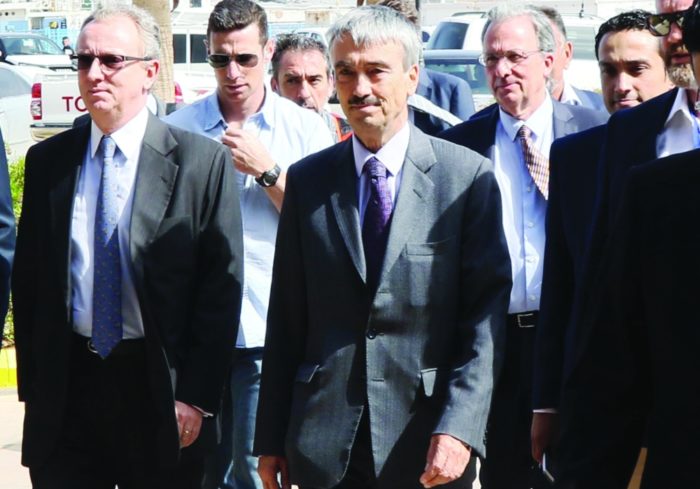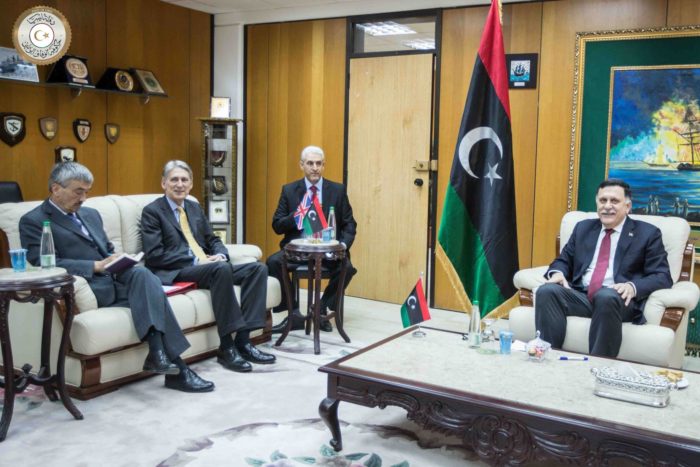22nd April 2016 Tripoli, Libya
A Taste of Tripoli

It’s not possible to understand a country without going to it. Even if you meet lots of its citizens and read lots of books, you have to go there to see it, meet the people and get under its skin.
So far I have been unable to visit Libya. I have met many Libyans in London, Tunis and Morocco, but I was very aware that they were no substitute for going there and meeting them in their own back yard.
Then last week, I had the chance to visit. Not once, but twice.
The first time, I flew in with my French and Spanish colleagues. We were met by protocol officials at Matiga airport, invited for a cup of coffee and taken to the Naval Base. Our meetings included members of the Presidency Council, the Minister of Interior, the Temporary Security Committee, 12 mayors from Tripoli municipalities, 4 members of the Libya Political Dialogue (old friends from Skhirat) and 11 members of the House of Representatives. We did a press conference with many Libyan media outlets.
The second visit 4 days later was to accompany the Foreign Secretary, Philip Hammond on a short official visit. This time we met Prime Minister Serraj and the Presidency Council, the Minister of Foreign Affairs and the press. We also went to see the Libyan navy boat that brought them to Tripoli from Tunisia and met the crew who were part of that expedition.
So how was it? As we landed, I looked down at the houses, the shops, the cars, the palm trees with curiosity and fascination. It looked like any other city with life going on as normal. On the ground, there was a lot of security around us but the atmosphere was calm. We passed people going about their business, shops selling fresh fish, fruit and vegetables and children going to school.
All the people we met made us feel very welcome and looked after with great hospitality and warmth. They told us how much they valued our support for their efforts to bring peace and security to Libya and that they wanted diplomatic missions to return as soon as possible.
Our central message was that we want the Skhirat Agreement to work and that we are ready to respond positively to requests for assistance. A central point is Libyan ownership: the Skhirat Agreement was the result of a dialogue between Libyans. They were the ones who negotiated the compromises and made the choices over the course of a lengthy, difficult process. Ambassadors and Envoys were like the chorus in a Greek play, echoing what the main players – the Libyans – were saying and offering comment and encouragement; but never being part of the action.

Now that the Libyans are implementing the agreement, the role of the international community is more active, but only in response to requests from the GNA. Intervention and interference are not part of our agenda, even if some observers always like to see a conspiracy lurking under every stone.
My two visits last week totted up a grand total of 8 hours on ground. I saw the coast road between Matiga and the naval base. That was an appetiser; the hors d’oeuvre for what I hope will be a feast of many dishes. On future visits, I want to see much more, not only of Tripoli but also of other parts of the country; not just the West but also the East and South.
Most importantly, I want to meet many more Libyans. I want to be able to wander in the souq or stop in a coffee shop and chat to find out what people are hoping will happen and how we can help.
Last week gave me a Taste of Tripoli. I now look forward to the next course.
Mixed bag of a country with contrasting extremes in almost all walks of life, from politics to religion and culture, and very little in the middle ground. I wish you all the best your excellency.
This blog is much appreciated, Mr Millett. You are in a front row position to appreciate the huge obstacle to progress which is presented by deeply entrenched suspicion. (Seems like “damned if we do; damned if we don’t” when we try to help). With suchlike blogs continuing the refrain of sincere friendship which yours has expressed so respectfully, Libyans and their supporters can dare to hope at last for this fair country to step onto the world stage more and more confidently. Libya is destined to play her historic role as an inspirational beacon, globally as well as regionally, of what is possible, and energetic. And talented.
Thanks for the insights into Tripoli, whence the new government will reach out to every corner of a richly diverse land. You seem to understand with a ready heart the honour as well as duty which you embrace with your service to Libya.
More, please…
your excellency…..
may I take this opportunity to thank Great Britain for its assistance through out the period, where the Libyan people needed help including what I call latent assistance which people in Libya are not aware of, indeed very few people in Libya do know that great Britain is hosting at the moment many Libyan families , such hospitality includes , accommodation, financial assistance free education to children and free health care. Great Britain helped Libya in the past too she was the founder of the Libyan army and the police force , many doctors , engineers had been educated and trained in Great Britain.. all in all Libya will always grateful to Great Britain.
so as far as I am concerned you are welcome in Libya anytime …sir and I wish to Libya and Great Britain a long lasting friendship and a prosperous relationship….finally , you must realize that GNA needs as much help as it can get specially during its infancy ,as many of our so called politicians have no idea what the bloody hill is going on ( excuse the expression )…… good luck in Libya you need it and lots of it … thank your excellency for your efforts and God bless you